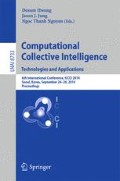Abstract
Most of the existing studies in utility mining use a single minimum utility threshold to determine whether an item is a high utility item. This way is, however, hard to reflect the nature of items. This work thus presents another viewpoint about defining the minimum utilities of itemsets. The maximum constraint is adopted, which is well explained in the text and suitable to some mining domains when items have different utility values. In addition, an effective two-phase mining approach is proposed to cope with the problem of multi-criteria utility mining under maximum constraints. The experimental results show the performance of the proposed approach.
Access this chapter
Tax calculation will be finalised at checkout
Purchases are for personal use only
Preview
Unable to display preview. Download preview PDF.
References
Agrawal, R., Srikant, R.: Fast Algorithm for Mining Association Rules. In: International Conference on Very Large Data Bases, pp. 487–499 (1994)
IBM Quest Data Mining Project, Quest synthetic data generation code, http://www.almaden.ibm.com/cs/quest/syndata.html
Lan, G.C., Hong, T.P., Tseng, V.S.: Discovery of High Utility Itemsets from On-Shelf Time Periods of Products. Expert Systems with Applications 38(5), 5851–5857 (2011)
Lan, G.C., Hong, T.P., Chao, Y.T.: Multi-Criteria Utility Mining Using Minimum Constraints. In: The 27th International Conference on Industrial, Engineering & Other Applications of Applied Intelligent Systems (2014)
Liu, B., Hsu, W., Ma, Y.: Mining Association Rules with Multiple Minimum Supports. In: International Conference on Knowledge Discovery and Data Mining, pp. 337–341 (1999)
Liu, Y., Liao, W.K., Choudhary, A.: A Fast High Utility Itemsets Mining Algorithm. In: International Workshop on Utility-based Data Mining, pp. 90–99 (2005)
Wang, K., He, Y., Han, J.: Mining Frequent Itemsets Using Support Constraints. In: The 26th International Conference on Very Large Data Bases, pp. 43–52 (2000)
Yao, H., Hamilton, H.J., Butz, C.J.: A Foundational Approach to Mining Itemset Utilities from Databases. In: The 4th SIAM International Conference on Data Mining, pp. 482–486 (2004)
Author information
Authors and Affiliations
Editor information
Editors and Affiliations
Rights and permissions
Copyright information
© 2014 Springer International Publishing Switzerland
About this paper
Cite this paper
Lan, GC., Hong, TP., Chao, YT. (2014). Multi-criteria Utility Mining Using Maximum Constraints. In: Hwang, D., Jung, J.J., Nguyen, NT. (eds) Computational Collective Intelligence. Technologies and Applications. ICCCI 2014. Lecture Notes in Computer Science(), vol 8733. Springer, Cham. https://doi.org/10.1007/978-3-319-11289-3_47
Download citation
DOI: https://doi.org/10.1007/978-3-319-11289-3_47
Publisher Name: Springer, Cham
Print ISBN: 978-3-319-11288-6
Online ISBN: 978-3-319-11289-3
eBook Packages: Computer ScienceComputer Science (R0)

